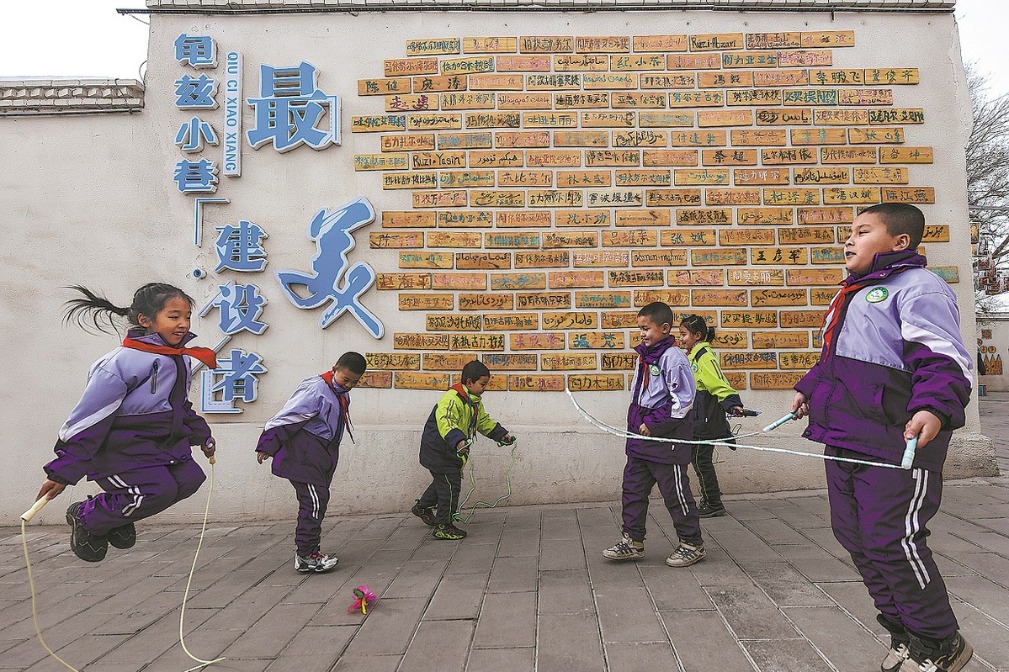New forests halt desertification


Zhang Erxing, director of the Leipingta committee, said: "We always saw a woman using a hoe on the mountain slopes in all weathers. Nobody knew where a woman like her, who was only slightly taller than the hoe, got all her energy from."
In the 1990s, Zhang Lianlian's efforts began to pay off. She contracted a large orchard from the village, and her son raised chickens in the forests and orchard. She won respect, and the villagers changed their minds about her.
Zhang Lianlian provides them with saplings for free and her son's business has created 300 jobs for locals. More than 40 families have been lifted out of poverty thanks to the help from her family.
Thanks to her, nearly all the families in the village have realized the importance of planting trees, and Leipingta village is now surrounded by 400 hectares of woods. Weng Dianlong, the village Party chief, said Zhang Lianlian has also helped to raise funds to build roads and support local education.
Zhang Lianlian said: "The changes in the village have finally allowed me to realize what my father meant. Trees change the ecology and prevent landslides. I hope I can be buried in woods when I die."
Yan'an is located in the center of the Loess Plateau, where the forest coverage rate has nearly doubled to more than 82 percent in the past two decades thanks to concerted efforts by the government and local people.
The amount of sand and soil carried from Yan'an by the Yellow River, which runs through the plateau, has fallen by almost 90 percent in the past decade because of rapid forest expansion.
Annual rainfall in the arid region has nearly doubled, and local planters have to erect umbrellas over each date tree in wet seasons in case the rain brings down the fruit.
The fact that Yan'an emerged from poverty early this month, way ahead of next year's deadline set by the central government, is partially attributable to its remarkable progress in forestation.
Gansu farm founded
In Gulang county, Gansu province, six men, ranging in age from 40 to 61, founded the Babusha Tree Farm in 1981, following the central government's call to launch the Northwest-North-Northeast China Shelter Forest Belt Project.
They contracted a southern border region of the Tengri Desert, which was moving south at a rate of 7 meters a year, threatening 30,000 farmers and more than 1,333 hectares of farmland.
Over the past 38 years, their efforts and those of their offspring have resulted in a 300-kilometer protective belt, consisting of 14,446 hectares of forest and 25,067 hectares of grassland. However, of the six men, two died in the early 1990s and two in the early 2000s.
He Zhongqiang, who is in his 50s and the son of one of the six, works as a tree planter at the farm. "My father told me that he felt sorry he had left me nothing apart from a few trees before he died in 1991. He fell sick because of overwork.
"Now is the best time for tree planters. We have the best conditions and policies for desertification control. There is no reason for me to quit," He said, adding that many friends had tried to persuade him to look for a city job.
Zhang Runyuan, the youngest of the six men, said: "At first, the work was extremely hard. We placed wheat straw around the saplings to fix the soil, otherwise a strong wind could blow away 60 percent to 70 percent of them.
"We lived in caves, and worked in shifts to prevent the saplings from being eaten by local farmers' sheep. This is even more important than planting trees sometimes," Zhang Runyuan said.
An oasis comprising trees, shrubs and grass has changed the situation. The tree farm workers can now secure more water to plant wheat, corn, melons and tomatoes to make the farm sustainable.
The workers are extending the forest belt to the north, and have planted more than 2,000 trees and shrubs since 2003.
- Shandong implements China's first maglev heat pump system
- Over 14,000 students with disabilities complete gaokao with some help
- Youth returns to 'isolated' mountain village to run boutique B&B
- PLA officer rescues five people from drowning
- Chinese scientists pioneer efficient paraxylene production from CO2
- Chinese researchers develop high-efficiency flexible thermoelectric material for wearables





































